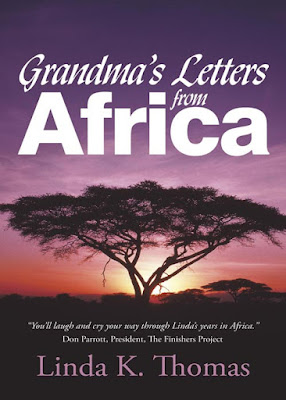Early
the next morning, while I was outside on my little trip to the choo (outhouse),
I took in more of our surroundings, seeing what was hard to see the night
before in the dark. The Mwakodis’ house sat on a little peak surrounded by
forest. They didn’t live in a village—their house seemed to be the only one
around. A narrow dirt trail passed by in front of the house.
Our
first full day with Mwakodis was a Sunday and, as Bwana had told us the night
before, we would be heading to church.
Bwana
and Mama put on their one set of fine clothes. Dave and I had only the camping
gear we’d brought on our orientation course, so I wore a denim skirt, T-shirt,
socks, and hiking boots. Kenyan men seldom wore short pants so Dave wore long
trousers and a button-down shirt with a tie.
When
the four of us walked out the door, Bwana said, “We will take the vehicle.”
You’ll
remember that our orientation directors, Brian and Jenny, by design, had left our
group of orientees on our own and that Dave had been elected our group’s point man, someone to be our spokesman or advocate during those three weeks, the
go-to person if anyone had trouble. With that responsibility, Dave also was given
The Pearl of Africa, the group’s old Toyota Land Cruiser, to use for official business, not
our own convenience. We were supposed to experience this last phase of
orientation in the same way as the others in our group, which meant we were
supposed to walk everywhere like everyone else.
So
when Bwana said, “We will take the vehicle,” Dave and I knew that wasn’t a good
idea. Dave said, “No, we can walk.”
Bwana,
who didn’t understand why we had The Pearl, smiled and repeated, “We will take
the vehicle.”
Dave
and I looked at each other briefly and somehow communicated with our eyes: This
was Bwana’s home and we were his guests. This was Bwana’s territory and we’d
better do things his way. So we drove.
We
meandered among the forested hills for three miles on a narrow dirt track. The
Taita Hills reminded me of the place we’d lived for the previous fourteen
years: the Olympic Mountains and their foothills near Port Angeles, about the
same elevation and covered with green.
Tropical
plants grew in the Taita Hills—papaya, citrus, and banana trees—but I also
spotted plants that grew back home in the Pacific Northwest: bracken ferns,
purple lobelia, berry vines, pine trees, and cedar.
We came
to a small clearing in the forest and spotted the Anglican Church, a small stick-and-mud/plaster
building, the same color as the earth.
Bwana
and Mama led us to the door and when we stepped inside, we interrupted the
children’s class. I’m pretty sure we were the first white people ever in their
church (and maybe the last) and we wazungu caused a stir—I mean a big stir.
Each
little face turned our direction. Their song leader scurried to regain the
children’s attention. Eventually, she convinced them to sing a couple more
songs, though they turned and watched us while they sang.
I
loved hearing the children sing. Their voices filled the room—a sharp contrast
to so many Sunday school children back home who rarely sing louder than a
whimper.
In
the break between Sunday school and the church service, people welcomed us with
courtesy, but we knew they found us curious—and very white—beings. For the
first time in my life, I found myself a member of the minority race.
For
the three-hour worship service, we sat on hand-hewn plank benches. The
congregation spoke Swahili in their prayers, songs, and Scripture readings, but
I suspect they spoke the Taita language in conversations and the sermon.
I
had no idea what people said. For all I knew, the pastor might have preached in
Chinese.
Dave
and I had lived in Kenya only a few weeks and—
Wham!
God
gave us a first-hand experience
like
that of millions of people around the world,
week
after week, year after year.
Without
a Bible in a language they understand,
they
walk out of their churches
with
little or no understanding of Scripture readings
or
their pastor’s sermon.
I
had known this in theory,
but
that day I personally experienced
why
people need Bibles in their own languages—
and
why we came to Africa:
to
help with the work of Bible translation.






